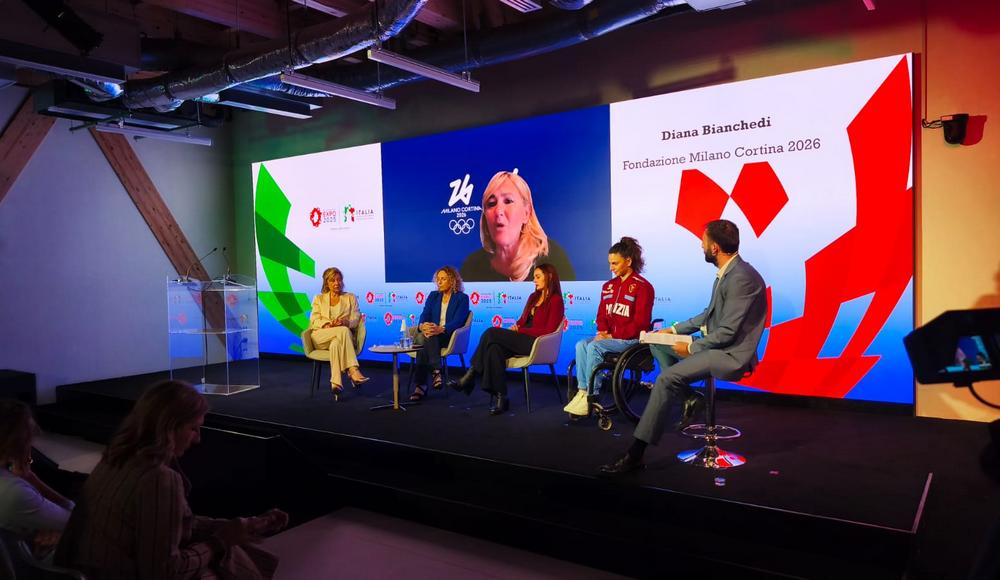CONI at Expo Osaka 2025 with the panel Sport That Leaves a Mark: the Future of our Regions

Sport as a driver of change and a tool for bringing cultures together. This was the central theme of the panel Sport That Leaves a Mark: the Future of our Regions, held on Sunday 4 May at the Auditorium of the Italy Pavilion at Expo Osaka 2025 in Japan. The event took place during the Co-creating Cultures for the Future thematic week, and was made possible thanks to collaboration between the Italian National Olympic Committee (CONI) and the Sports Diplomacy Office of the Ministry of Foreign Affairs and International Cooperation. Also taking part were the Italian Paralympic Committee, the Milano Cortina 2026 Foundation, and business representatives involved through the Ministry, including Assosport, Banca IFIS and RCS Group.
“We are absolutely delighted to have had so many sport-related events this week at Expo, and we are very grateful to CONI, which has enabled so many young people from around the world to play together and enjoy moments of shared sport here outside the Italy Pavilion,” said Mario Vattani, Italy’s Commissioner General at Expo 2025, in his opening remarks. The Pavilion’s commitment to promoting sporting values was also underlined by Consul Filippo Manara. The panel, moderated by ANSA journalist Francesco Betrò, offered an opportunity to reflect on the social and economic impact of major sporting events and the legacy they leave for host regions and for Italy as a whole.
“Sporting events leave behind both tangible and intangible legacies for host regions,” said Cecilia D’Angelo. “They result in the creation of modern, functional sports facilities designed to last well beyond the event itself, and they help to promote the region’s image, showcase its excellence and boost its appeal at national and international level. They also provide a platform to advance key social issues such as gender equality, showing how major events can act as powerful drivers of rights and inclusion. On an educational and cultural level, major events offer a unique opportunity to invest in younger generations through volunteering, training, and awareness-raising initiatives around crucial topics such as environmental sustainability and human rights,” concluded the CONI Territorial Director.
The most powerful witnesses to the change that sport can bring are the athletes themselves. After taking part in the Olympic and Paralympic Games, they “change, mature, and come away with a new outlook – and the same happens to the regions that host these events. They are transformed by the experience of sport and the powerful values it brings. Once the event is over, they are no longer the same,” said Olympic windsurfing champion and multiple medallist Alessandra Sensini. There’s also the need to ensure that events are not only sustainable but also increasingly inclusive, a goal to be pursued through culture and education, as highlighted by Paralympic champion Giulia Ghiretti, representing the Italian Paralympic Committee (CIP): “Years ago, when Paralympic athletes won, they were written about in the news section. Today, they are in the sports section. Education breaks down prejudice and stereotypes, and that starts at school. Teaching about Paralympic sport and sport in general is a powerful lever for cultural development and social cohesion. The path is always being built, and if we can build it together, I believe we can go much further.”
The event carried particular weight in light of the upcoming Olympic and Paralympic Winter Games Milano Cortina 2026: “The Games have to be a spark that drives transformation in our country through sport, and we are truly working together to make that happen,” explained Diana Bianchedi. “With Milano Cortina 2026, our regions have taken on a commitment: these will be the first ever ‘widespread’ Games, with two cities pledging to evolve through the Games, and they will also be the first Winter Olympics with improved gender balance,” added the Chief of Strategic Planning and Legacy at the Milano Cortina 2026 Foundation. Representing the Ministry of Foreign Affairs was Silvia Marrara, Embassy Counsellor and Head of the Sports Diplomacy Office, who spoke about the role of sports diplomacy and introduced the “Champions of Innovation” initiative to promote female entrepreneurship in sport. Closing the event, industry leaders Manuela Viel (Assosport), Arianna Colombari (Assosport – Tecnica Group), Carmelo Carbotti (Banca IFIS), Paolo Bellino (RCS Sport) and Ivan Basso shared their experience of the Giro d’Italia as a powerful engine for territorial promotion.


